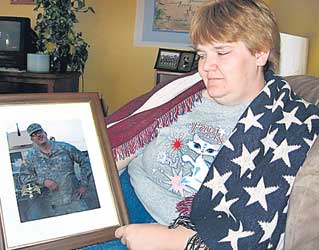
|
U.S. families mourn lost soldiers, question war HUMBOLDT, Kan., Dec 13 (Reuters) - U.S. Army National Guard Spc. John Wood is everywhere inside the quiet clapboard house just off the main street in Humboldt, Kansas. Pictures of him in uniform in Iraq or smiling at home with his kids cover walls and tabletops. Wood's medals share a corner cabinet with a white teddy bear that reads "Hurry Home," and a folded American flag in a glass case rests on a windowsill.
On a December day, Wood's wife, Lannette, rests on a sofa with a flag-embroidered afghan around her shoulders and waits for delivery of his death certificate. Because even though Wood is everywhere, he is nowhere. A day before he would have turned 38, on Oct. 7, Woods, the father of four children ages 8 to 16, was killed by a roadside bomb. He was one of 106 U.S. soldiers killed in Iraq in October, one of the deadliest months for American soldiers since the United States launched the Iraq war in March 2003. "He was supposed to be home on Nov. 10," Lannette Wood, 34, said. "I could almost feel him home." More than 2,925 U.S. soldiers have lost their lives in Iraq, according to the Defense Department and more than 22,000 have been wounded. Over recent weeks, on average, 2 to 3 have died every day. The mounting loss of life and uncertainty about how to bring the conflict to a close spurred voters in November to shift power in Congress to opposition Democrats, drove last month's ouster of Defense Secretary Donald Rumsfeld and has pushed President George W. Bush to seek a new war strategy. Polls now show broad support for a quick withdrawal of troops and several groups of military families are among those calling for withdrawal. As the casualties rip holes into families and communities throughout the nation, the deaths are forcing a growing number of military families to re-evaluate their views on the war. Some find solace in a belief that their soldiers died protecting America from otherwise certain attacks. Others say the fighting in Iraq is a failure and a waste of lives. But many agree that whether they mourn privately, enveloped in tight circles of church and military support, or with fanfare honoring a "war hero," the war is exacting a price they increasingly see as too high. COST TOO HIGH "Something's got to change. We've got to get someone in there who knows how to make a difference and try to get it going for the better instead of all this violence," said Ann Mock of Harper, Kansas, whose 23-year-old son Willsun Mock was killed in Iraq Oct. 22 by a roadside bomb. "I was so against us going to war," said Mock. "But now I want to say that my son's sacrifice was not in vain and not just his sacrifice but all the others." For Cleveland, Ohio, father Paul Schroeder it has been over a year since he received first a coffin and then, weeks later, an urn, and still later another urn, bearing the remains of his 23-year-old son Marine Lance Cpl. Edward "Augie" Schroeder. "Life is never the same. It is devastating what it does to a family," said Schroeder, who has formed a group called "Families of the Fallen" that counts 1,400 members. Kim Smith of San Antonio, who lost her 19-year-old son, Army Pvt. Robert L. Frantz, in June 2003 when he was hit by a grenade in Baghdad, said she tries to honor her son by reaching out to other families of lost soldiers but still struggles with sorrow."It's been a long road," Smith said. "He was just a baby." The military attempts to cushion the blows with "casualty assistance" officers assigned to each family, grief counseling, death benefits and college funds for children. John Wood's family said the military support they received has made his loss at least bearable. Still, when Wood's 12-year-old son wanted to place a letter to his father inside his casket, but couldn't because it had been sealed to prevent a viewing of the badly damaged body parts, the pain was nearly too much. "The cost is too high," said Wood's sister Shelley Cole. "I'm angry. I lost my brother over there. What it does to a family ... the cost is too high." |
| || Front
Page | News
| Editorial
| Columns
| Sports
| Plus
| Financial
Times | International
| Mirror
| TV
Times | Funday
Times || |
| |
Copyright
2006 Wijeya
Newspapers Ltd.Colombo. Sri Lanka. |
